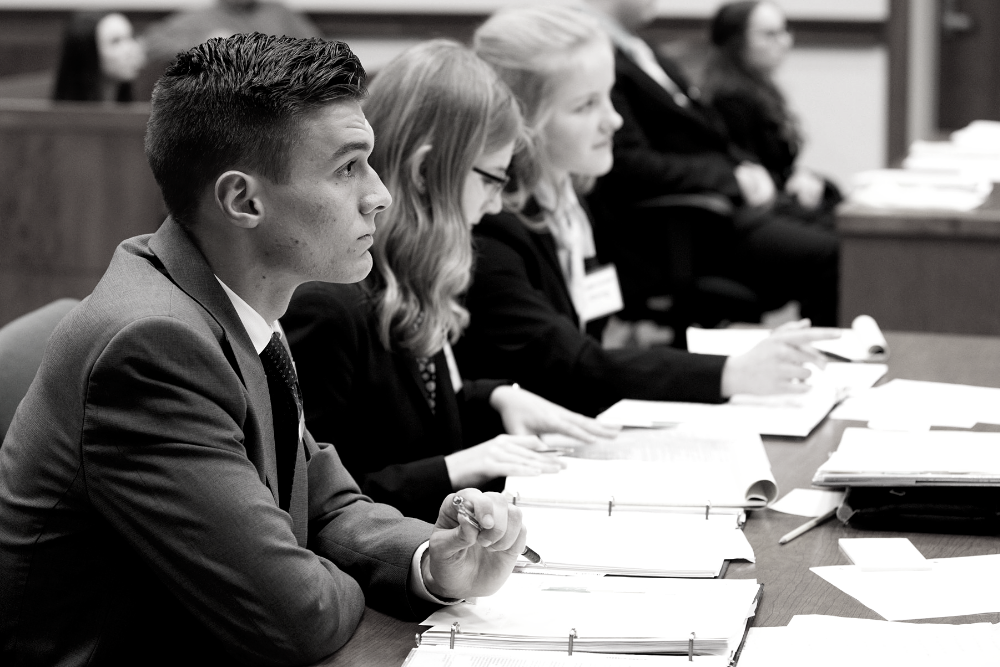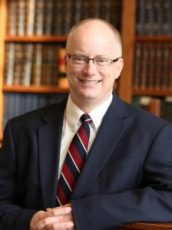
Have you ever wondered what Mock Trial is all about? Today’s episode explains how this intellectual sport works and how it combines some of the best parts of a classical education. Two students and their coach share stories, lessons learned and why Mock Trial has been one of the best decisions they ever made…and why more students should consider joining. Every school should start a Mock Trial team if they don’t have one already. Learn how on this episode!
 David Goodwin has served as the full-time President of the Association of Classical Christian Schools (ACCS) since 2015. Formerly, he was the Head of The Ambrose School, a classical Christian school in Boise, ID from 2003 through 2014. He served on the ACCS board as an elected member from 2010 to 2014, and helped develop the strategic plan for the ACCS. Prior to his work in classical Christian education, Mr. Goodwin spent 13 years in marketing and new business development for a large computer products manufacturer. He holds an MBA and BIS from Boise State University. He and his wife, Stormy, work as a team on many ACCS projects and attend All Saints Presbyterian Church in Boise, Idaho. They are the parents of three children, one who attends New Saint Andrews College in Moscow, ID and two who attend The Ambrose School.
David Goodwin has served as the full-time President of the Association of Classical Christian Schools (ACCS) since 2015. Formerly, he was the Head of The Ambrose School, a classical Christian school in Boise, ID from 2003 through 2014. He served on the ACCS board as an elected member from 2010 to 2014, and helped develop the strategic plan for the ACCS. Prior to his work in classical Christian education, Mr. Goodwin spent 13 years in marketing and new business development for a large computer products manufacturer. He holds an MBA and BIS from Boise State University. He and his wife, Stormy, work as a team on many ACCS projects and attend All Saints Presbyterian Church in Boise, Idaho. They are the parents of three children, one who attends New Saint Andrews College in Moscow, ID and two who attend The Ambrose School.
Kristen Stanciu, a sophomore, and Liam Owens, a junior, currently attend The Ambrose School in Boise, ID. They have participated in Mock Trial for the past two years — Kristen in the role of attorney and Liam in the role of witness. Their team won 2nd place in Idaho’s state championship in 2019. In 2018, Liam served on the A team which won State. This year, both were the recipients of Outstanding Attorney and Witness awards, respectively. Additionally, the Law-Related Education Director announced at the 2019 semi-final round of State that Liam Owens was the only student in all of Idaho this year to receive an Outstanding Witness Award in every round of Regional and State Mock Trial Competitions.
Thinking Fast On Your Feet
– Mock Trial Delivers
Estimated reading time: 5 min, 27 sec. (1091 words)
“So, do you want to be a lawyer?”
Mock Trial students anticipate this question everywhere they go.
Carrying briefcases and looking extra sharp, these teenaged “pretend” lawyers usually respond, “I don’t know,” or “Not really.” Of course, a few are genuinely interested in the legal system. They find Mock Trial a great opportunity to experience what courtroom life really entails.
But no matter their future plans, practically all agree on one essential point. They wouldn’t trade their Mock Trial experience for anything. And they can’t believe how they almost didn’t jump in.
On a recent BaseCamp Live interview, host Davies Owens asks a coach and two team members, Kristen Stanciu and Liam Owens, why they are such avid fans of Mock Trial. All three are members of the Mock Trial team at the Ambrose School in Boise, ID.
Mock Trial is where a student’s character, a courtroom case and rhetorical training all converge
So what is Mock Trial, exactly?
Replicating an actual trial in a standard courtroom, each round consists of two teams of about eight students, including three attorneys and three witnesses, who are prepared to argue either side. An actual judge or attorney serves as the presiding judge. Attorneys from the outside community sit in the jury box and score each team.
The trial is based on a real case written by the state law foundation or law association. “This year’s case had some elements relating to cell phone locations and a murder case,” says Ambrose coach David Goodwin. “It was based on forensic evidence, the cell phones, their locations and how the actual bullets were found.”
After months of preparation, each team competes in Regionals and then, hopefully, State. At State, the Superbowl of Mock Trial, the last two standing teams duke it out for Nationals.
Annually, the state-winning teams converge on one selected city where the best team in the nation rises to the top. Judges serve from all over the country. According to Goodwin, “The classical Christian schools (CCS) put up a lot of schools in Nationals relative to their size with CCS being less than 1% of the schools in the US. As you would expect, you find a lot of public schools and a lot of big private schools. Out of Tennessee, one of the classical Christian schools that belongs to the ACCS managed to get third place at Nationals (in 2018) and that is stunning.”
The invaluable lifetime skills students learn from Mock Trial
The Ambrose students agree that while at first the scope of the work is huge, the lessons learned will follow them their entire lives. They’ve learned how to engage in disagreements well, apply logic, become better listeners, and make connections – all while thinking fast on their feet.
Kristen Stanciu, a sophomore and one of the Ambrose team’s attorneys, describes the months-long preparation process and where it can lead. “Looking through the case with a fine tooth comb and coming up with a theory and what we want to argue and then being prepared to argue both sides of the case equally well and confidently…You come into the final round and walk into this marble Supreme Court building and you come against the other best team in the state.”
Unlike debate where both sides can fire off as many facts as possible, Mock Trial isn’t about how much you know. Rather, says Coach Goodwin, you are “taking the same set of facts everybody else has and making a better argument.”
Learning to pivot and think on your feet
While the opening statements are memorized and delivered to present each side’s theory, the attorneys and witnesses sometimes have to veer off script. This might happen when the opposing counsel presents unforeseen information or your evidence is not admitted.
Kristen experienced this firsthand and sees added bonuses. “When you are in the courtroom and you are forced to make decisions that could impact the outcome of a trial and you need to know what to say in that moment…being able to do that really benefits me in my day to day life because it helps me when I’m talking about other issues.”
Ultimately, the team is scored on eloquence, the flow and clarity of the theme, rules of evidence, the handling on evidence, pivoting and responding to the other side within the time allotted.
Mock Trialers become better listeners in real life
After years of learning to write and speak eloquently and persuasively, Liam applied his rhetorical skills as a Mock Trial witness. As a junior, he says that being on the team has “absolutely” helped him become a better listener in his everyday life.
As a witness, “You may respond to a question but you need to see the intent of the other person in Mock Trial three questions down the lane. Where might the attorney be going with this? Is the attorney trying to get me into a trap? Is the attorney trying to get me to say something that I shouldn’t?”
Keep an open mind, students
Kristen was initially concerned about managing the workload along with her other activities. She soon discovered that she enjoyed Mock Trial so much that she found the time for it.
According to Liam, “I really do wish that more kids would do Mock Trial for this reason…Mock Trial helps you to see words on a page as ideas that interlock and weave together…the ability to take information and read it as more than just what’s presented to you but as a container for multiple ideas.”
Coach Goodwin saw an unexpected benefit when pointing out how Kristen chose to rewrite her closing at least five times. “Try to get a writing teacher to get a student to rewrite something five times and you’re going to have a grumpy student. I can’t get them to stop!”
Key Takeaway
To hear more about the impact that Mock Trial has had on these students and what it could do for you and your school, tune in to the episode. If you are interested in starting a Mock Trial program at your school, see the links below. Member schools of ACCS can access the Member Resources Center and find information about starting a team. Parents and interested students in every state also enjoy watching live regional and state competitions and seeing Mock Trial firsthand.
LINKS:
https://classicalchristian.org/ – Where member schools of ACCS can access Member Resources
